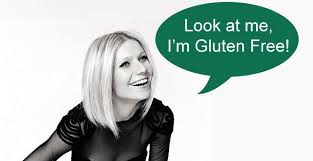There are over 300 symptoms and diseases medically and scientifically linked to gluten, these include headaches, stubborn weight, foggy brain, depression, mood swings, fatigue, skin issues, dry scalp, insomnia, sexual malfunction, back pain, joint pain, muscle soreness, bone deterioration. Also, a surprisingly high proportion of women diagnosed with osteoporosis were also found to have Coeliac Disease when tested. Gluten also causes damage to the surface of the small intestine and stifles the body’s ability to absorb nutrients.
A growing body of research also suggests gluten may affect the brain; linking it to depression, dementia, Alzheimer’s and Parkinson’s. Some studies indicate schizophrenia symptoms are minimised when gluten is removed from the diet.
Gluten is also linked to ADD, ADHD, Autism, stunted growth, muscle atrophy, and a compromised immune system – that’s essentially what Coeliac Disease is, an exhaustion of the auto-immune system until it fails and starts misreading food.
Remove gluten from your diet by focusing on vegetables, meats, fishes, potatoes and lentils. Reduce ad eventually eliminate pastas, cakes, breakfast cereals, most breads, certain types of sauces and some ready meals. Here’s a quick guide to what to avoid if you are experiencing gluten intolerance symptoms:
The following grains and starches contain gluten:
- Wheat
- Wheat germ
- Rye
- Barley
- Bulgur
- Couscous
- Farina
- Graham flour
- Kamut Matzo
- Semolina
- Spelt
- Triticale
The following foods often contain gluten:
- malt/malt flavoring
- soups
- commercial bullion and broths
- cold cuts
- French fries (often dusted with flour before freezing)
- processed cheese (e.g., Velveeta)
- mayonnaise
- ketchup
- malt vinegar
- soy sauce and teriyaki sauces
- salad dressings
- imitation crab meat, bacon, etc
- egg substitute
- tabbouleh
- sausage
- non-dairy creamer
- fried vegetables/tempura
- gravy
- marinades
- canned baked beans
- cereals
- commercially prepared chocolate milk
- breaded foods
- fruit fillings and puddings
- hot dogs
- ice cream
- root beer
- energy bars
- trail mix
- syrups
- seitan
- wheatgrass
- instant hot drinks
- flavored coffees and teas blue cheeses
- vodka
- wine coolers
- meatballs, meatloaf communion wafers
- veggie burgers
- roasted nuts
- beer
- oats (unless certified GF)
- oat bran (unless certified GF)
The following are miscellaneous sources of gluten:
- shampoos
- cosmetics
- lipsticks, lip balm
- Play-Doh
- medications
- non self-adhesive stamps and envelopes
- vitamins and supplements (check label)
The following ingredients are often code for gluten:
- Avena sativa Cyclodextrin
- Dextrin
- Fermented grain extract
- Hordeum distichon
- Hordeum vulgare
- Hydrolysate
- Hydrolyzed malt extract
- Hydrolyzed vegetable protein
- Maltodextrin
- Phytosphingosine extract
- Samino peptide complex
- Secale cereale
- Triticum aestivum
- Triticum vulgare
- Tocopherol/vitamin E
- Yeast extract
- Natural flavoring
- Brown rice syrup
- Modified food starch
- Hydrolyzed vegetable protein (HVP)
- Hydrolyzed soy protein
- Caramel color (frequently made from barley)
If you think you could be gluten sensitive your GP can advise on screenings to diagnose you. Most stores now have extensive gluten free ranges. Check out Holland & Barrett http://www.hollandandbarrett.com/info/free-from , Sainsbury’s http://www.sainsburys-live-well-for-less.co.uk/recipes-inspiration/healthier-eating/healthier-diets/allergies-and-intolerances/sainsbury%27s-freefrom-range and Tesco http://realfood.tesco.com/our-food/tesco-free-from.html
Shani Shaker BA (hons), dipION, mBANT, CNHC, is a registered nutritional therapist with a focus on regenerative and functional nutrition. Based in London her services include one-to-one coaching, group classes and Skype sessions. Contact her at [email protected]
Disclaimer: The information provided is intended for your general knowledge only and is not a substitute for professional medical advice or treatment for specific medical conditions. Please consult your healthcare provider with any questions or concerns you may have regarding your condition. Supplementation should only be temporary. If you’re eating a nutrient-rich diet, extra supplementation should only last for a month or two, just long enough to resolve the deficiency.




